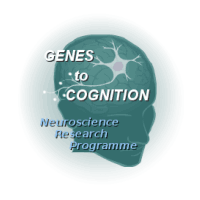G2C::Behaviour
Learning and memory, perception, attention and other psychological phenomena are different aspects of function required when a brain processes information. There is enormous interest in determining how nerve cells and their associated molecules participate in cognitive processes.
This information is also of great medical importance, as conditions such as Alzheimer's, schizophrenia and autism are diseases of cognition.
A key discovery that led to the G2C program was that a collection of proteins known as the "NMDA Receptor Complex (NRC)" is involved in cognition and diseases other of the nervous system (10862698). The NRC contains 185 proteins and in humans, 48 of those have been implicated in 54 different nervous system disorders (16150739), a number which is likely to grow with the use of more refined techniques and advanced research.
The G2C programme has, among others, groups of scientists with expertise in human and non-human animal behaviour as well as experts in the study of human and non-human genetics.
The G2C scientists can therefore work together to first identify gene mutations in mice and humans and then test animal and human performance in a variety of tests specific to cognitive function.
There are many different forms of learning and memory. These use different areas of the brain and can involve selective use of specific proteins. One form of memory in humans, known as declarative memory, involves NRC proteins in a specific brain region called the hippocampus. For example, defects in declarative memory are demonstrated by the inability to recall spatial or navigational information. Procedural memory, as demonstrated by remembering how to ride a bicycle or play the piano, is an example of one of the non-declarative aspects of memory. One can have selective deficits in these systems so that there could be impaired declarative but normal procedural memory. This combination of deficits and abilities explains how people could be found not knowing where they are, even though they rode a bicycle to get there. Similar dissociations of various aspects of learning and memory are available in non-human testing as well, and there the advantage is to permit the discovery of the role of specific proteins with more accuracy.
Very little is known about the molecular basis of human behaviour in general and the G2C programme will focus on cognition. This will not only provide insight into this aspect of brain function, but will also aim to test scientific approaches that may later be applicable to a broader range of other behaviours.
Phenotyping Protocols
| Protocol | Description | View |
|---|---|---|
| P00000014 | Behaviour: Elevated Plus Maze | View |
| P00000015 | Behaviour: Open field exploration (OF) | View |
| P00000016 | Behaviour: Novel Object Exploration (NOE) | View |
| P00000017 | Behaviour: Radio Frequency Identification system (RFID) implantation | View |
| P00000018 | Behaviour: Rotorod | View |
| P00000019 | Behaviour: Fear Conditioning Training and Testing | View |
| P00000020 | Behaviour: Test battery and derivation of behavioural variables | View |
